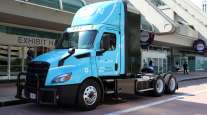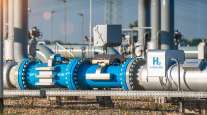Staff Reporter
Nikola Class 8 FCEV Truck Production Nudges Up to 43 in Q1

[Stay on top of transportation news: Get TTNews in your inbox.]
Nikola Corp. produced 43 and wholesaled 40 Class 8 hydrogen fuel cell electric vehicles in the first quarter of 2024, the truck maker said.
Previously, the original equipment manufacturer expected to deliver between 30 and 35 trucks in the first three months of 2024.
All the trucks wholesaled to Nikola dealers are destined for end customers, the company said, adding that the three remaining vehicles in inventory at the end of Q1 already had been allocated and would be delivered in early April.
Phoenix-based Nikola shipped 35 trucks in the fourth quarter of 2023. It manufactured 42 trucks in Q4, less than a third of 133 trucks produced in the year-earlier period. Nikola produced 138 trucks in 2023, compared with 258 a year earlier.
>
Nikola is only building hydrogen fuel cell electric trucks at present in Coolidge, Ariz., after halting manufacturing of battery-electric trucks in May, vehicles that were later recalled. Serial production of the FCEV Tre semi began July 31.
Nikola expects its truck deliveries to be in a 400-450 range in 2024, Corporate Controller Brian De Hoog said during the company’s quarterly earnings call Feb. 22, adding that 100 would be new BETs. Production of BETs is expected to restart later this year.

Girsky
“We are on track for a successful 2024 by continuing the momentum set in 2023,” CEO Steve Girsky said April 4. “It’s about more than just setting goals. It’s about following through on our commitments. This includes not only the production and sale of our hydrogen fuel cell electric trucks but also the start of returns for our [BETs] to customers.”
Nikola said April 4 it had commenced the return process for the “BEV 2.0” trucks to customers.
The company said Feb. 22 it remained on track to get the first recalled BETs back in customers’ hands by the end of March.
During the February call, Girsky said Nikola intended to return all BETs to customers by late in the second quarter or early in the third quarter.
Greg Hewitt of DHL Express considers whether the trucking industry is prepared for a greener future. Tune in above or by going to RoadSigns.ttnews.com.
“BEV 2.0” is understood to be lighter and have improved charging capabilities compared with the recalled trucks.
In August, Nikola said all the Tre BETs it had sold or sent to potential customers for testing to that point were being recalled after a series of fires. A total of 209 trucks were recalled.
Originally, the recall was seen to be the result of a coolant leak inside the battery pack involving the coolant manifold and related coolant lines, but it went beyond that, so Nikola replaced the batteries.
The issue involved battery packs manufactured by Romeo Power, which, at the time the trucks rolled off the production line, was owned by Nikola. The truck maker set aside $61.8 million to cover the cost of the recall. Romeo Power was later liquidated.
Recalling the trucks and replacing the batteries was one of a number of drains on Nikola’s finances in 2023.
Want more news? Listen to today's daily briefing above or go here for more info
In Q4 2023, Nikola’s loss ratcheted down 30.8% year-over-year but was still $153.6 million, and the company reported a loss of just shy of $1 billion in 2023.
Nikola appointed Thomas Okray chief financial officer March 4, ending a three-month stint during which Girsky wore the CEO and CFO hats.
One of Okray’s top tasks will be reducing Nikola’s cash burn as production of the Tre FCEV ramps up.
Okray previously served as CFO at component manufacturer Eaton and parts distributors Grainger and Advance Auto Parts. Before that, he spent 14 years at General Motors, where his path intersected with Girsky’s.
Alongside building FCEV and battery-electric trucks, Nikola aims to ramp up expansion of its hydrogen fueling infrastructure in 2024, which the company envisions as a virtuous circle.
“We anticipate further [FCEV] sales growth in future quarters as our Hyla hydrogen fueling solutions come online,” Girsky said April 4. “This includes our recently celebrated first modular refueling station in Ontario, Calif., as well as our first Canadian refueling station in Edmonton, Alberta.”





